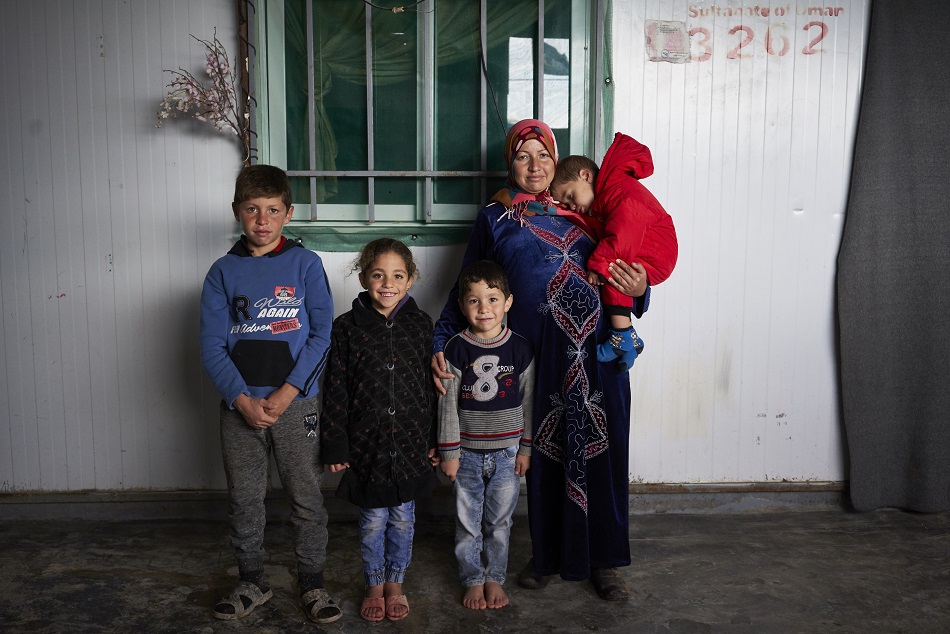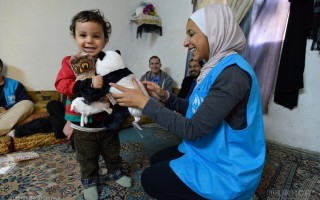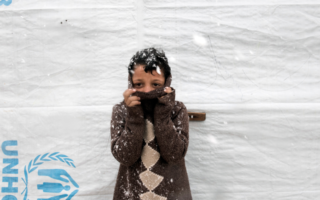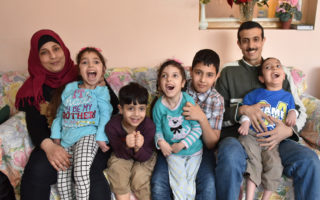
Zeenab, 33, who is eight-months pregnant, holds her two-year-old son Mohamed as she poses for a photograph with her son Murad, 11, left, daughter Rahaf, 7, son Laith, 4, at their shelter in Zaatari camp, Jordan. © UNHCR/David Azia
ZAATARI CAMP, JORDAN—The sight of corpses all around was simply unbearable for Zeenab.
“My house was destroyed, the whole country was destroyed and we really didn’t have a safe place to stay at,” said Zeenab, originally from the small town of Otaybah in rural Damascus in Syria.
“There was a lot of strikes and children’s dead bodies all around us. I couldn’t bear that sight and I didn’t want my kids to end up like that.”
The young mother had seen enough of the raging violence in war-torn Syria and the shelling that decimated her home to know she needed to take action to steer her loved ones out of harm’s way.
In February of 2014, Zeenab and her family embarked on a four-day trek to reach Jordan, eventually relocating to Zaatari Camp, which is close to the country’s northern border and home to some 80,000 refugees. However, the initial path in search of safety was plotted with significant challenges along the way — namely the lack of supplies to stay warm.
“I had five little kids with me and I only brought two change of clothes for each,” recalled Zeenab. “It was during winter, and on our way we had to leave a lot of our belongings because we could not carry them. The journey was very difficult.”
“Each one of us only had the jacket he was wearing. We couldn’t bring any blankets because it was really hard to carry everything,” she continued. “I was holding one of my children and my husband was holding the other one. The other kids were still very little, too, so I couldn’t make them carry anything either, especially that it was during winter and the roads were very muddy.”
Sitting in her shelter in Zaatari Camp, the memories of the journey to Jordan still linger like a winter’s chill. Zeenab’s eyes began to dampen, filling with tears as she recalled the extreme cold, and the family’s desperate attempts to stay warm.
“We were holding each other tight … that’s it. It was a very difficult time,” she said, as she brushed away the tears spilled upon her cheeks.
“But thank God, now the situation is better. At least I feel safe and secure. I can sleep and make sure that my kids are with me.”
Zeenab is now a mother to six children – with another on the way. She is eight months pregnant, and mother to daughter Rahaf, seven, and sons Eskander, 13, Murad, 11, Kais, 9, Laith, 4, and Mohamed, 2.
Her family is the recipient of winter cash assistance from UNHCR, providing them with the funds so sorely needed to equip their shelter for the challenging winter conditions.
UNHCR has been distributing winter assistance to vulnerable Syrian refugees like Zeenab in both Zaatari and Azraq camps in Jordan reaching more than 24,000 families as of the end of December 2017. Support has come in the form of in-kind and cash assistance, such as money for gas to cover the cost of refills and for shelter maintenance.
Zeenab said there is still a considerable amount they need in terms of supplies such as mats and winter essentials to cope with the cold. But they are appreciative of the goods they have to stay sheltered against the elements.
“We’re grateful,” said Zeenab. “Winter here is difficult, but it’s still better than Syria. However, the caravans are very cold. We can get the heaters running for five days and then we run out. It doesn’t get warm enough. It’s hard especially for the little kids. They sit in front of the heater and don’t leave it.”
In addition to refugees in Jordan like Zeenab, UNHCR’s winterization programme has reached more than 3.1 million Syrians and Iraqis as of the end of December 2017. Despite the generous contributions, the funding falls short of the total of 3.81 million UNHCR has deemed among the most vulnerable, which includes Syrian and Iraqi internally displaced persons, as well as refugees in countries including Syria, Turkey, Lebanon, Jordan, Iraq and Egypt.
Zeenab has tried to establish a new sense of routine and normalcy with her children, enjoying time working on activities like art projects, the finished works adorned prominently on the wall of the family home. Still, she can’t help but lament for the life abruptly left behind in Syria.
“We had a house. A home that we could close its doors, and feel warm and secure with the kids,” she recalled.
“The most difficult thing for the children was to adapt to the school here and the new friends. The school environment in the camps is very different than the one they used to have in Syria.”
Zeenab expressed hopes of returning to her homeland, and the chance to once again live in a house not unlike the one she was forced to leave behind. She said her brother-in-law has resettled in Canada and has applied for family reunification.
In the meantime, she expressed happiness in seeing her older children continuing on with their schooling.
“Of course, every mother wishes the best for her children. Every mother wants her kids to be educated and be proud of them.”





